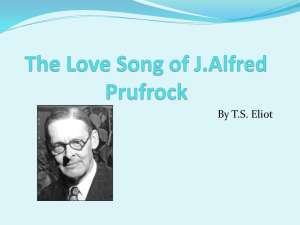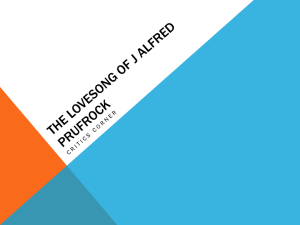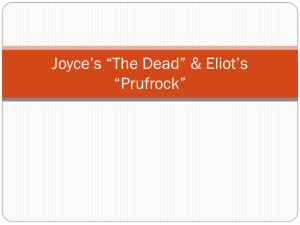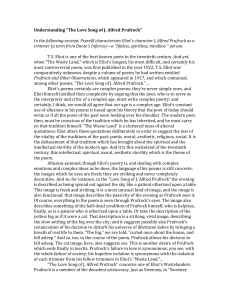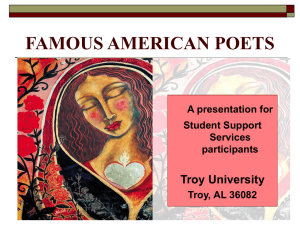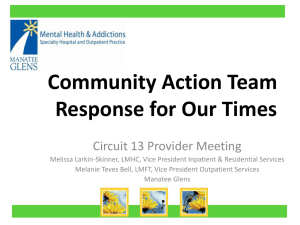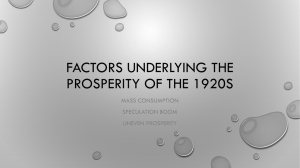The Love Song of J. Alfred Prufrock
advertisement
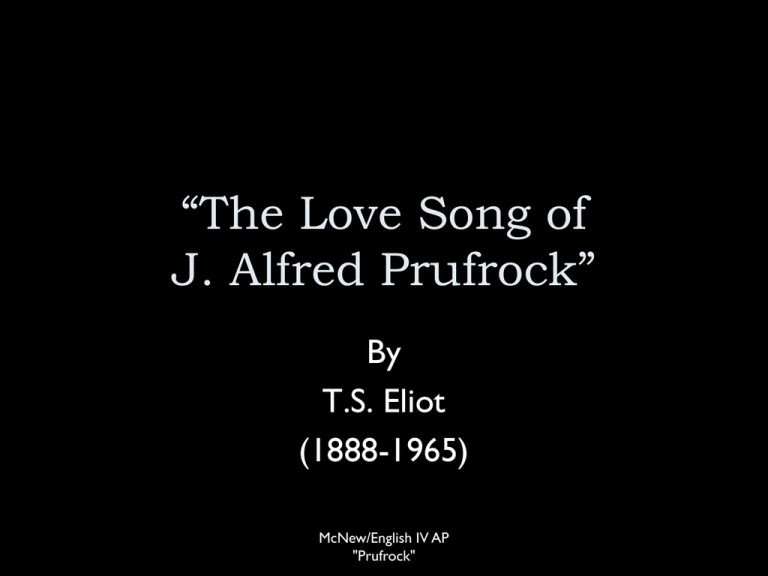
“The Love Song of J. Alfred Prufrock” By T.S. Eliot (1888-1965) McNew/English IV AP "Prufrock" Modernism • Characterized chiefly by a rejection of 19th century traditions – Example—often rejected traditional meter in favor of free verse • Emphasized humanism over nationalism • Argued for cultural relativism • Emphasized the ways in which humans were part of and responsible to nature McNew/English IV AP "Prufrock" Modernism • Argued for multiple ways of looking at the world • Presented antiheroes, uncategorizable persons, and anti-art movements like Dada • Challenged the idea that God played an active role in the world • Argued no thing or person was born for a specific use; instead, people found or made their own meaning in the world • Rebelled against industrialized nations because of their greed and warmongering McNew/English IV AP "Prufrock" Authors • Novelists –Introduced stream of consciousness »Joseph Conrad »William Faulkner »James Joyce »Virginia Woolf McNew/English IV AP "Prufrock" Authors • Poets –Fragmentary Imagery –Complex allusions »Ezra Pound »T.S. Eliot McNew/English IV AP "Prufrock" Epigraph • A passage from Dante Alighieri's Inferno (Canto 27, lines 61-66) spoken by Guido da Montefeltro in response to the questions of Dante, who Guido supposes is dead, since he is in Hell. The flame in which Guido is encased vibrates as he speaks: "If I thought that that I was replying to someone who would ever return to the world, this flame would cease to flicker. But since no one ever returns from these depths alive, if what I've heard is true, I will answer you without fear of infamy." McNew/English IV AP "Prufrock" Epigraph – Connection to poem? • Prufrock, like Guido da Montefeltro, does not expect his thoughts to be heard • Interior Monologue McNew/English IV AP "Prufrock" Rhetorical Structure • Question—Answer • Contemplation—Inaction • Invitation--Destination McNew/English IV AP "Prufrock" Invitation--Destination • Prufrock invites someone (“Let us go then, you and I,…Let us go,…Let us go and make our visit.”) to journey with him. – To whom is the invitation extended? » The reader? » Something or someone inside of Prufrock? – What is the destination? » Ultimately, it is nowhere. » Prufrock contemplates interacting with people around him (especially women) but he never does. McNew/English IV AP "Prufrock" Who is Prufrock? (Characterization) • Indecisive • Contemplative • Reflective • Intelligent and well-read – Allusions to the Bible (John the Baptist), Shakespeare (Hamlet), Marvell (“To His Coy Mistress”) • Humorous – Mocks himself frequently McNew/English IV AP "Prufrock" Who is Prufrock? (Characterization) • Thin • Balding • Insecure • Lonely • Fearful • Foolish • Older? –Mid-life crisis? McNew/English IV AP "Prufrock" Who is Prufrock? (Characterization) • Self-aware –Remember, all of the information given about Prufrock comes from Prufrock himself McNew/English IV AP "Prufrock" Structure of Poem – Meter • Not free-verse • Meter varies – Rhyme • Internal and end rhyme McNew/English IV AP "Prufrock" Setting and Imagery • The simile comparing the evening to a “patient etherized upon a table” • “half-deserted streets” • “The muttering retreats/ Of restless nights in one-night cheap hotels” • “And sawdust restaurants with oyster-shells:” • “Streets that follow like a tedious argument/ Of insidious intent” • “yellow fog” and “yellow smoke” in later stanzas • “dusk” McNew/English IV AP "Prufrock" Tone • Dismal and depressing setting • Commentary on society? McNew/English IV AP "Prufrock" The Actions of the Cat – The cat rubs its back against the window pane – The cat rubs its muzzle on the window pane – The cat licks the corners of the window pane – The cat allows the soot from the chimneys to litter its back – The cat recognizes it is an October night, curls up and falls asleep McNew/English IV AP "Prufrock" The Purpose of the Cat –Prufrock compares himself to the cat. –The cat stays at the window and does not interact with other people. »Reason for not interacting? »“There will be time” (stanza four) »Repeated many times »Delaying action. McNew/English IV AP "Prufrock" The Purpose of the Cat Contemplates interacting with people, but never does. “And indeed there will be time/ To wonder, ‘Do I dare?’ and, ‘Do I dare?’/ Time to turn back and descend the stair” McNew/English IV AP "Prufrock" “There will be time” Repetition • Suggests predictability of existence – Gives a reason (or an excuse?) for why he does not have to act now. McNew/English IV AP "Prufrock" Allusion • Andrew Marvell’s “To His Coy Mistress” – “Had we but world enough, and time” » Carpe diem » The speaker is trying to convince his mistress not to be coy and, instead, seize the moment » Ironic reference considering it carries the opposite meaning for Prufrock » Again, we can assume Prufrock is aware of the irony. McNew/English IV AP "Prufrock" Insecurities: Physical Appearance • Prufrock is aware of his physical appearance • Prufrock assumes what other people say about his appearance –These assumptions fuel his indecisiveness McNew/English IV AP "Prufrock" More Assumptions • Prufrock believes that all people are the same. • Uninteresting, boring people live in an uninteresting, boring world. • Therefore, why should he do anything? McNew/English IV AP "Prufrock" Who He Is and Who He Should Have Been • “Should I say, I have gone at dusk through narrow streets And watched the smoke that rises from the pipes Of lonely men in shirt-sleeves, leaning out of windows?... I should have been a pair of ragged claws Scuttling across the floors of silent seas.” McNew/English IV AP "Prufrock" Who He Is and Who He Should Have Been • Prufrock is the lonely men staring out of windows • Why should he have been a crab? – A crab is insignificant – A crab is alienated – A crab is lonely • Not even a full crab, rather a “pair of ragged claws” McNew/English IV AP "Prufrock" Hypothetical Speculation • Would his interaction with other people, especially a woman, be worth it? • Prufrock believes the result of his interaction/conversation would be rejection and criticism. • Is interaction worth rejection and criticism? McNew/English IV AP "Prufrock" Hypothetical Speculation • “To have squeezed the universe into a ball” – Another reference to Marvell’s “To His Coy Mistress” • “Let us roll all our strength and all/ Our sweetness up into one ball.” – Prufrock wonders if it would be worth it to do the same thing with a woman he is interested in. McNew/English IV AP "Prufrock" Hypothetical Speculation • Lazarus – Brother of Martha and Mary – Friend of Jesus – Jesus raised him from the dead McNew/English IV AP "Prufrock" Hypothetical Speculation • Lazarus – Leprous beggar – Dies and is taken into heaven – A rich man dies, goes to hell and requests that Lazarus returns to earth to warn the rich man’s brothers about the horror of hell. – His request is denied McNew/English IV AP "Prufrock" Hypothetical Speculation • To which Lazarus is Prufrock comparing himself? – Probably both – Prufrock believes either Lazarus would not be listened to. McNew/English IV AP "Prufrock" Michelangelo • “In the room the women come and go Talking of Michelangelo” – Reflection of his insecurity – Prufrock recognizes the predictability of the conversation of women – If the topic of their discussion is Michelangelo, how could Prufrock possibly interest them? McNew/English IV AP "Prufrock" Hamlet • Even though he has characteristics of Hamlet (indecisiveness), Prufrock does not consider himself to be a great man. • Instead, Prufrock compares himself to the Fool (Yorick) and the attendant lord (Polonius) – “Politic, cautious, and meticulous; Full of high sentence, but a bit obtuse; At times, indeed, almost ridiculous” • Prufrock mocks himself McNew/English IV AP "Prufrock" Recapturing Youth • “I grow old…I grow old… I shall wear the bottoms of my trousers rolled. Shall I part my hair behind? Do I dare eat a peach? I shall wear white flannel trousers, and walk upon the beach.” – A futile attempt to appear young and “in-tune” with the times McNew/English IV AP "Prufrock" Mermaids • References the sirens of the Odyssey – Dangerous – Prufrock does not believe the mermaids will ever sing for him • Suggests eternal loneliness McNew/English IV AP "Prufrock" Mermaids • Prufrock says he will dream of the mermaids’ songs “Till human voices wake us, and we drown.” – Humanity breaks the romantic spell of the mermaids – Drowning suggests loss of hope. – Therefore, the loss of hope occurs because of humanity. McNew/English IV AP "Prufrock"
